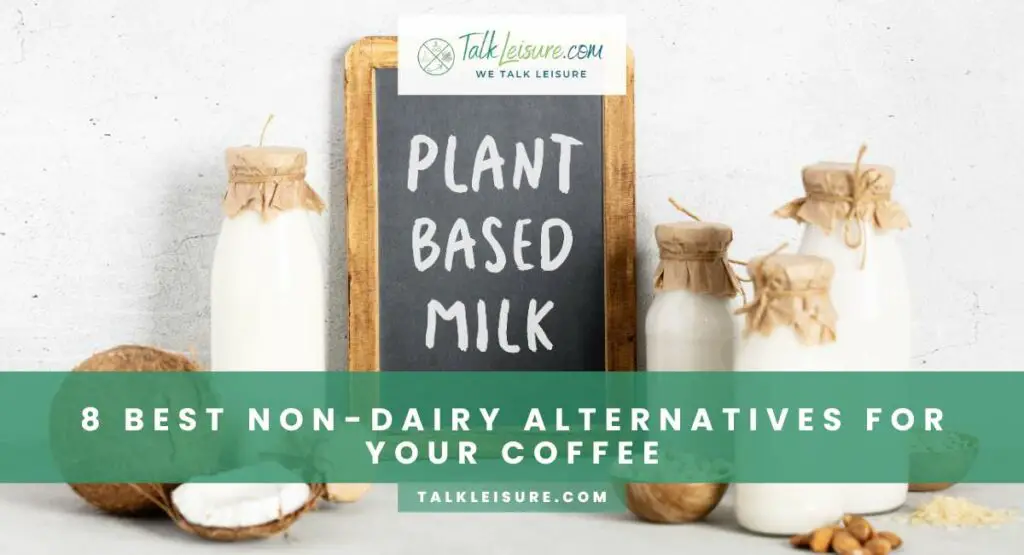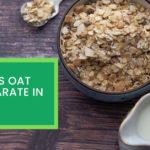Many people opt for non-dairy alternatives for their coffee for various reasons, such as dietary restrictions, lactose intolerance, or simply a preference for plant-based options.
Non-dairy alternatives provide a creamy and flavorful addition to your favorite morning beverage without the use of dairy products.
Here, we will explore the eight best non-dairy alternatives for your coffee.
These non-dairy alternatives are not only delicious, but they also offer a range of health benefits.
Whether vegan, lactose intolerant, or simply looking to try something new, these alternatives are worth exploring to enhance your coffee experience.
1. Oat Milk
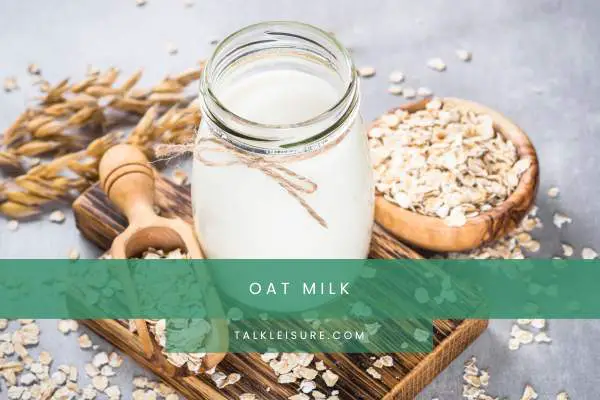
Oat milk has quickly gained popularity as one of the best non-dairy alternatives for coffee.
Made from oats soaked in water and blended, oat milk offers a slightly sweet and creamy flavor that pairs perfectly with the rich taste of coffee.
It has a smooth and velvety texture and adds a delightful creaminess to your favorite morning beverage.
One of the main reasons why oat milk has become a favorite among coffee lovers is its versatility.
It can be easily frothed and steamed, making it a great option for creating latte art or adding a whipped topping to your coffee.
The creamy consistency of oat milk also allows it to blend seamlessly with hot or iced coffee, ensuring a consistent taste and texture.
Another benefit of oat milk is its nutritional profile. It is naturally low in fat and cholesterol-free, making it a healthier choice than traditional dairy milk.
Oat milk is also a good source of fiber, vitamins, and minerals, including calcium and iron.
It is often fortified with additional nutrients to ensure a well-rounded beverage option.
Additionally, oat milk is suitable for those with dietary restrictions or allergies.
It is naturally free from lactose, dairy, soy, and nuts, making it a safe choice for individuals with intolerances or allergies to these ingredients.
Oat milk is also commonly used in vegan and plant-based diets as a non-dairy alternative.
Regarding availability, oat milk can be found in most grocery stores and cafes, making it easily accessible for consumers.
It is often sold in cartons or bottles, both refrigerated and shelf-stable options.
You can also find various flavors of oat milk, such as vanilla or chocolate, to add an extra twist to your coffee experience.
2. Coconut Milk
Coconut milk is another excellent non-dairy alternative for coffee that offers a creamy and tropical flavor.
Made from the grated flesh of mature coconuts, coconut milk provides a rich and indulgent taste that can enhance your coffee experience.
One of the main advantages of using coconut milk in your coffee is its natural sweetness.
The sweetness of the coconut milk can balance out the bitterness of the coffee, creating a perfectly well-rounded flavor.
Additionally, the richness of the coconut milk adds a smooth and velvety texture to your coffee, making each sip a delightful treat.
Coconut milk is delicious and a healthy choice for your coffee.
It is low in calories, making it a suitable option for those who are conscious of their calorie intake.
Unlike dairy milk, coconut milk is also free from lactose, making it an excellent alternative for individuals who are lactose intolerant.
Furthermore, coconut milk contains healthy fats, known as medium-chain triglycerides, that can provide various health benefits, including improved brain function and increased energy levels.
Another advantage of using coconut milk is its versatility.
It can easily be frothed and steamed, allowing you to create lattes with a creamy foam or indulge in a delicious coconut milk cappuccino.
Coconut milk is also a great addition to iced coffee, adding a refreshing and tropical twist to your cold beverage.
Regarding availability, coconut milk can be found in canned and carton forms in most grocery stores and supermarkets.
The canned variety tends to be thicker and more affluent, while the carton version is often diluted and suitable for everyday use.
Flavored coconut milk options, such as vanilla or chocolate, can add an extra layer of decadence to your coffee.
3. Soy Milk
Soy milk is a popular non-dairy alternative to coffee that offers a creamy and nutritious option.
Made from soybeans, soy milk is rich in protein and provides a smooth texture when added to coffee.
It has a subtle, nutty flavor that complements the taste of coffee without overpowering it.
One of the main advantages of using soy milk in your coffee is its ability to froth well.
Soy milk can be easily frothed, allowing you to create latte art and enjoy a cappuccino-like experience.
The frothy texture adds a touch of elegance to your coffee and makes each sip a treat for the senses.
Soy milk is also a healthy choice for your coffee. It is naturally low in saturated fat and cholesterol, making it a heart-healthy option. Additionally, soy milk is a good source of essential nutrients, such as calcium, vitamin D, and potassium.
These nutrients contribute to overall bone health and can help support a balanced diet.
For individuals with lactose intolerance or dairy allergies, soy milk is an excellent alternative.
It is free from lactose and contains no animal products, making it suitable for vegans and those following a plant-based diet.
Soy milk is also a sustainable choice, as the production of soybeans requires less water and resources than dairy milk.
4. Rice Milk
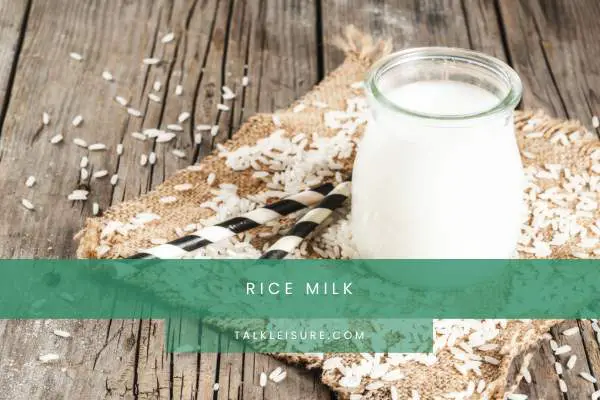
Rice milk is another popular non-dairy alternative that can be a great addition to your coffee.
Made from milled rice and water, rice milk has a mild and naturally sweet flavor that complements the taste of coffee.
It has a thinner consistency than dairy milk but still provides a creamy texture that adds richness to your coffee.
One of the main advantages of using rice milk in your coffee is its hypoallergenic properties.
Rice milk is free from lactose, dairy, soy, and nuts, making it suitable for individuals with allergies or intolerances.
It is a gentle option for those with sensitive stomachs or digestive issues, as it is easy to digest and doesn’t cause stomach discomfort.
Rice milk is also low in fat and cholesterol, making it a healthier alternative than other non-dairy options.
It is naturally cholesterol-free and contains no saturated fat, which can benefit individuals looking to reduce their intake of these substances.
When it comes to finding rice milk for your coffee, you can easily find it in most grocery stores or supermarkets.
It is available in both refrigerated and shelf-stable versions.
It is important to note that rice milk can naturally separate when added to hot coffee, so giving it a good shake or stir before pouring it into your cup is recommended.
While rice milk is a versatile option for your coffee, it is important to consider that it may have different frothing capabilities than dairy milk or some other non-dairy alternatives.
If you enjoy frothy or foamy coffee, consider exploring alternative milk options.
However, rice milk can still add a creamy and flavorful touch to your coffee, making it a popular choice for many individuals.
5. Cashew Milk
Cashew milk is a delicious and creamy non-dairy alternative that can enhance the flavor of your coffee.
Made from blended cashews and water, cashew milk has a smooth texture that adds a velvety richness to your cup of joe.
It has a slightly nutty flavor that complements the taste of coffee without overpowering it.
One of the great things about cashew milk is its versatility. It can be easily incorporated into various coffee drinks, including lattes, cappuccinos, and even iced coffees.
Whether you prefer a hot or cold coffee, cashew milk can significantly enhance the taste and texture.
In addition to its delicious flavor, cashew milk offers several health benefits.
It is naturally low in calories and contains beneficial nutrients like healthy fats, protein, and vitamins.
The healthy fats in cashew milk, including monounsaturated fats, can contribute to a balanced diet and promote heart health.
Cashew milk is also an excellent option for individuals with dietary restrictions or allergies.
It is free from lactose, soy, and gluten, making it suitable for those with lactose intolerance or sensitivity to dairy or soy products.
It is also a nut-based milk alternative, so it is essential to be cautious if you have a nut allergy.
6. Pea Milk
Pea milk is a lesser-known non-dairy alternative gaining popularity among coffee drinkers.
Made from yellow peas, this plant-based milk is a sustainable option and offers a creamy texture and a subtle nutty flavor that pairs well with coffee.
One of the main advantages of pea milk is its nutritional profile.
It is rich in protein, containing about 8 grams per serving, which is comparable to cow’s milk.
This makes it an excellent choice for individuals looking to increase their protein intake or those following a plant-based diet.
Pea milk is also fortified with essential vitamins and minerals, such as calcium and vitamin D, to ensure you still get the necessary nutrients.
Another benefit of pea milk is its low environmental impact.
The production of pea milk requires less water and land compared to traditional dairy farming.
Yellow peas are nitrogen-fixing plants, which means they help enrich the soil and reduce the need for synthetic fertilizers.
By choosing pea milk for your coffee, you can positively impact the environment.
When it comes to taste, pea milk has a smooth and creamy consistency that blends well with coffee.
Its slightly nutty flavor adds depth to your cup without overpowering the coffee’s natural taste.
Whether you prefer a black coffee, latte, or iced coffee, pea milk can be a versatile choice that enhances your coffee-drinking experience.
Pea milk is also suitable for individuals with dietary restrictions or allergies.
It is free from lactose, soy, and gluten, making it a viable alternative for those with lactose intolerance or sensitivities.
However, it’s important to note that pea milk is made from legumes, so it’s best to avoid this option if you have a pea or legume allergy.
7. Almond Milk
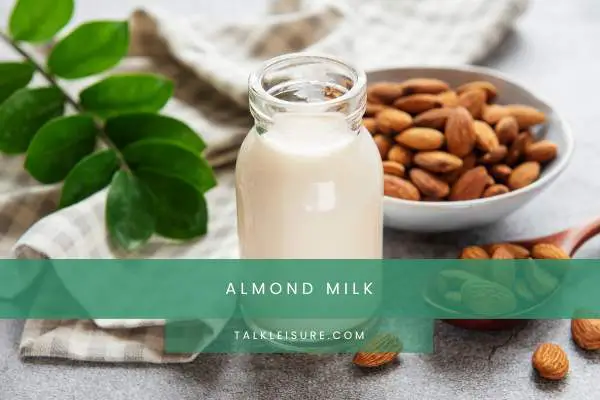
Almond milk has quickly become one of the most popular non-dairy alternatives for coffee lovers.
Made from ground almonds and water, this creamy milk substitute offers a subtly nutty flavor that pairs perfectly with the rich taste of coffee.
One of the key advantages of almond milk is its low calorie content.
It is significantly lower in calories than cow’s milk, making it an excellent option for those looking to watch their calorie intake without sacrificing flavor.
It is also naturally free from cholesterol and saturated fat, making it a heart-healthy choice.
Almond milk is also rich in nutrients. It is a good source of vitamin E, which is an antioxidant that helps protect cells from damage.
It also contains calcium, which is essential for strong bones and teeth.
Some brands of almond milk are also fortified with additional vitamins and minerals, such as vitamin D and B12, to ensure you still get the essential nutrients you need.
8. Macadamia Nut Milk
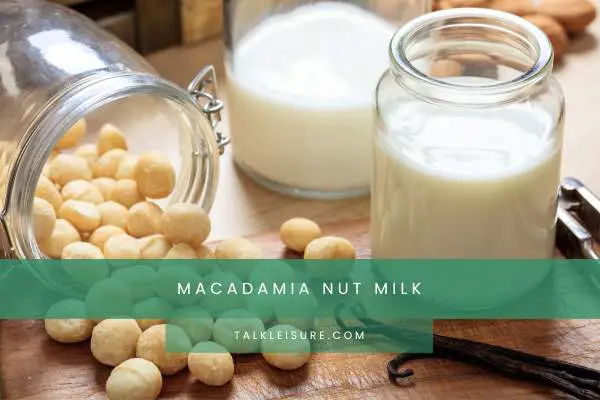
Macadamia nut milk is a delicious, creamy, non-dairy alternative gaining popularity among coffee enthusiasts.
Made from blending macadamia nuts with water, this milk substitute offers a rich and nutty flavor that perfectly complements the taste of coffee.
One of the main benefits of choosing macadamia nut milk for your coffee is its creamy texture.
This milk is naturally thick and smooth, giving your coffee a velvety mouthfeel that adds a touch of luxury to your morning routine.
The richness of macadamia nut milk enhances the flavor of coffee, creating a truly indulgent experience.
In addition to its taste and texture, macadamia nut milk is also a healthy choice.
It is low in calories and saturated fat, making it a great option for those watching their weight or following a heart-healthy diet.
Macadamia nuts are also rich in monounsaturated fats, which are known to have various health benefits, including reducing inflammation and promoting heart health.
Conclusion
When enjoying a cup of coffee without dairy, numerous options suit various tastes and dietary preferences.
We have explored eight of the best non-dairy alternatives for your coffee, each with its unique benefits and characteristics.
First on our list was almond milk, a popular choice among coffee lovers for its creamy texture and subtle nutty flavor.
It is also readily available in most stores and easily made home.
Next, we had oat milk, known for its smooth and oat-y taste and its ability to froth well for those fancy latte art designs.
Coconut milk, with its tropical flavor and rich consistency, offers a delightful twist to your coffee routine.
It adds a touch of sweetness and pairs wonderfully with solid brews. Hemp milk, however, is a great option for those looking for a dairy-free milk with a slightly nutty and earthy taste.
Plus, it is packed with nutrients and Omega-3 fatty acids.
Soy milk, one of the earliest non-dairy milk alternatives, has become a staple in the coffee community.
Its mild flavor and smooth texture make it an excellent choice for lattes and cappuccinos.
For those seeking a unique flavor, try rice milk, which is naturally sweet and light, making it a refreshing addition to your coffee.
If you prefer a more neutral taste profile, pea milk might be the perfect match.
It has a subtle, creamy texture that complements the flavors of coffee without overpowering them.
Lastly, macadamia nut milk offers a velvety mouthfeel and a rich, nutty taste that adds a touch of indulgence to your daily cup of joe.
Related Posts: 7 Most Popular Coffee Drinks and Their Origins

